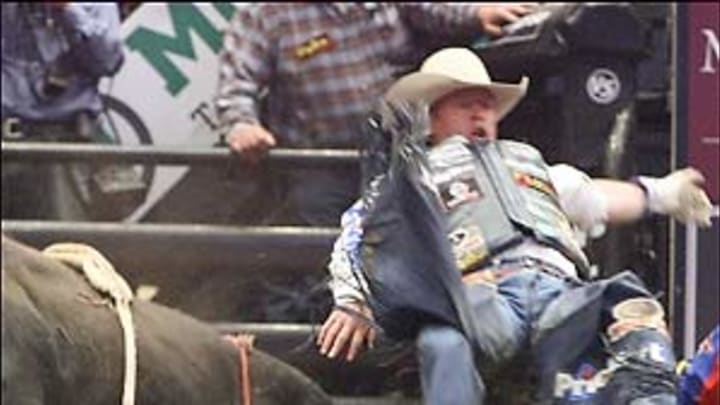Waiting for the buzzer


The bulls come in shades of mean like Frank the Tank and Slammer, even a Chad Pennington-owned Get Ir Done. They snarl, they throw snot, they buck, and, last week, they did it in New York City as the Ford Tough rodeo series made a stop at Madison Square Garden.
The cowboys on the series saddle up on the bulking creatures for eight seconds at a time, hoping to earn paychecks ranging from $20,000 to over $50,000 for a first-place finish. The lucky cowboy last weekend was Valdiron de Oliveira, a Brazilian born-bull rider who held his breath as he watched fan favorite Chris Shivers get bucked off Bad Medicine in the final round. That ride, combined with de Oliveira's atop a bull named Outsider, helped him nab $31,400.
"The win means everything because I came to the United States to be a world champion," said de Oliveira, his hands bloodied from holding onto the rope so firmly. "To win this event in NYC, it's a big step up."
While the big prize seems like a paltry amount compared to what other professional athletes earn, it's the largest payday the two-year tour veteran has earned this year. His prize money last year amounted to $88,015 after he placed in 27 cups. The year before, he took home a little more than $16,000.
"He has to be careful what he does with that money," said a fellow rider. "He might get hurt next week and not be able to compete for six months."
And riders do get hurt. Last year, de Oliveira was hospitalized for a week after a bull stepped on his stomach. In New York last weekend, fans watched passively as second-place finisher J.B. Mauney was dragged around by a bull when his dismount caused his spur to get caught in the rope. Earlier that day, another rider was taken out of the ring with a bloodied face after his head collided with a bull's horns. One of the tour's top stars, Justin McBride, is sidelined for more than six months as he undergoes rehabilitation of his left shoulder following surgery for ligament and cartilage damage and a torn rotator cuff.
The decision to compete against the odds of injuries, death and no paydays is explained in mounds of country songs dedicated to the sport. Some of the riders say they were born to do -- ("I get so excited ... I just want to ride that bull," said de Oliveira), or that they're drawn by camaraderie among the cowboys who often live together ("you can't compete against you're buddies, you compete against the bulls"), and then there are the parties ("let's give a cheer to wake up the young men who didn't realize there are two one o'clocks in a day," said the announcer, ribbing on the younger cowboys who were still tired from the Jack Daniels sponsored party the night before).
Being successful in Professional Bull Riding (PRB) can turn a cowboy into a household name in certain parts of the country and help him earn fame that transcends rodeo fame. Shivers has been featured in Esquire, while McBride has released his own country cd, appeared at the Country Music Awards and claims country star Tracy Byrd as a good friend.
"I'm sure I wouldn't have made a record if I wasn't a world champion bull rider," McBride said.
That niche fame can turn into the real big money in the sport: endorsement deals. Wrangler jeans, Enterprise Car Rentals, Cinch jeans and ranch equipment companies are big sponsors of riders and the PBR, and eventually successful riders can bring in seven figures a year. Some riders wear their endorsements on their protective vests, while others advertise the lack thereof ("Your logo here" says the top of Dustin Elliott's vest) -- if they can stay on the tour and compete. Marketed solely on its riders, the sport is a natural for the cowboys to turn themselves into brand names.
"Financially, PBR has given me everything I've got," said McBride. "I've got a 3,200-acre ranch bought and paid for by the PBR."
As PBR grows, the pot for all of the riders grows too -- the company now gives shares of the company as rewards to cowboys, based on points finished on the tour. While the PBR's financial statements aren't public, it's annual revenues are estimated to be around $60 million by Sean Gleason, its chief marketing officer, and the company continues to grow internationally. In 2002, attendance was an estimated 10 million and by 2006 attendance had grown to 20 million.
But for unsponsored riders like de Oliveira, that win in New York, those eight seconds of glory might have been enough to keep him getting back on the bull.
"I don't even remember what happened," he said, as he received congratulations and calls for a bigger belt buckle. "I have no words."
And for today, he has a paycheck and another chance to get back on the bull.
"This is one of the last true sports, there's no guarantees, there's no contracts," McBride said. "You have to ride, and you have to win or else you're gone."
